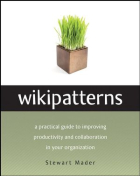
Stewart Mader, author of “Wikipatterns – A Practical Guide to Improving Productivity and Collaboration in Your Organization” provided me with a copy – and I promised to write a review in exchange, both on Amazon which I did and here in my blog. Two disclosures are necessary, yes, Stewart’s working for Atlassian, provider of enterprise wiki Confluence, but it doesn’t shine through, this book is independent, and no, I didn’t receive any perks or goodies to make me write a positive review.
Now, I am planning to offer a session on wiki patterns and success factors of corporate wiki implementations at the upcoming BarCamp Mitteldeutschland next weekend, so this review is timely.
The main goals of this book are to provide practical advice and a toolbox of wiki patterns for encouraging wiki use, and it’s a really nice and handy resource indeed. The collection of patterns is systematized along people patterns, adoption patterns, people anti-patterns and adoption anti-patterns, all in relation to context, problem and solution/work-around. This way it supports proper use of this wide set of tools, as one can check whether, when, what, why and how to use a specific approach, and also what to do when counter-indicators are there. Moreover, this book is filled with practical examples, case studies and interviews with wiki champions, that demonstrate the real-life complexities too, e.g. that a successful wiki introduction in organizations needs a number of different roles interplaying.
Overall I can say that I really enjoyed Wikipatterns, even when most of the ideas and concepts weren’t new to me – I am following the corresponding wikipatterns wiki from the start and I do argue mostly along the lines of wikipatterns when consulting and working with implementation projects. In fact my wiki consulting toolbox contained wiki patterns all along, i.e. for several years, yet without me calling them that way.
 Now this book isn’t for consultants in the enterprise social space alone, it’s also an excellent read for managers and people who want to introduce a more collaborative way of working into their organisations and who are pondering wiki use: It’s an eye-opener, especially because it shows that success doesn’t come easily with wikis (does it with any tool?), and that it takes some effort and commitment. So, Wikipatterns both advises for a thorough needs analysis before starting off with wikis and to proceed swiftly and from a grass-roots starting point. For example Stewart makes it perfectly clear that Wikipedia isn’t the only use case to follow, that an organization’s wiki hasn’t much to do with Wikipedia, nor has it much to learn from it. I agree, and would add that choosing the right wiki engine is a success factor too and choosing a wiki engine shouldn’t be done lightly (like the folks who choose Mediawiki because everybody does it …) and without thorough analysis of actual corporate needs.
Now this book isn’t for consultants in the enterprise social space alone, it’s also an excellent read for managers and people who want to introduce a more collaborative way of working into their organisations and who are pondering wiki use: It’s an eye-opener, especially because it shows that success doesn’t come easily with wikis (does it with any tool?), and that it takes some effort and commitment. So, Wikipatterns both advises for a thorough needs analysis before starting off with wikis and to proceed swiftly and from a grass-roots starting point. For example Stewart makes it perfectly clear that Wikipedia isn’t the only use case to follow, that an organization’s wiki hasn’t much to do with Wikipedia, nor has it much to learn from it. I agree, and would add that choosing the right wiki engine is a success factor too and choosing a wiki engine shouldn’t be done lightly (like the folks who choose Mediawiki because everybody does it …) and without thorough analysis of actual corporate needs.
So, to close this entry (and somehow squarely with Amazons reviewer rules which ask you to give up your rights on your very own words …) I enclose my Amazon review, where I focussed more on the change management implications this book offers:
Stewart Maders “Wikipatterns – A Practical Guide To Improving Productivity and Collaboration In Your Organization” is a very well-written book that informed and enlightened me in many ways, giving me both ideas and inspiration.
On the outside it’s a well-filled tool-box of approaches and “implementation patterns”, complete with case studies and interviews with organizational pilot-users and implementers of enterprise wikis, that makes it suitable for “beginning wiki implementers”.
But while the primary focus is on “how to implement a wiki in an organization”, and the many paths and opportunities are treated comprehensively and with a hands-on-approach, it’s **also** an excellent book on “how to keep the energy levels up”, i.e. how to ensure the success of the organizations wikis in the long term.
Wiki patterns is thus also becoming essential reading for anyone involved in scaling and large-scale roll-outs of social software in the enterprise, i.e. for organizational architects, managers and consultants that want to understand the relations of organizational change management and social software.